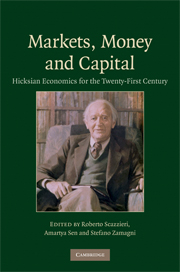Book contents
- Frontmatter
- Contents
- List of figures
- List of tables
- List of contributors
- Preface and acknowledgments
- Between theory and history: on the identity of Hicks's economics
- Part I The Intellectual Heritage of John Hicks
- Part II Markets
- Part III Money
- Part IV Capital and Dynamics
- 15 ‘Distribution and Economic Progress’ after seventy years
- 16 Flexible saving and economic growth
- 17 The economics of non-linear cycles
- 18 A perspective on a Hicksian non-linear theory of the trade cycle
- 19 Capital, growth, and production disequilibria: on the employment consequences of new technologies
- 20 Capital and time
- 21 Sequential analysis and out-of-equilibrium paths
- References
- Name index
- Subject index
16 - Flexible saving and economic growth
Published online by Cambridge University Press: 29 June 2009
- Frontmatter
- Contents
- List of figures
- List of tables
- List of contributors
- Preface and acknowledgments
- Between theory and history: on the identity of Hicks's economics
- Part I The Intellectual Heritage of John Hicks
- Part II Markets
- Part III Money
- Part IV Capital and Dynamics
- 15 ‘Distribution and Economic Progress’ after seventy years
- 16 Flexible saving and economic growth
- 17 The economics of non-linear cycles
- 18 A perspective on a Hicksian non-linear theory of the trade cycle
- 19 Capital, growth, and production disequilibria: on the employment consequences of new technologies
- 20 Capital and time
- 21 Sequential analysis and out-of-equilibrium paths
- References
- Name index
- Subject index
Summary
Macroeconomic income distribution, inequality, and growth
Christopher Bliss, himself a distinguished scientist in the finest Oxbridge tradition, in his authoritative entry on ‘Hicks, John Richard’ written for The New Palgrave, writes:
Hicks's huge output … is all the more remarkable when one considers that he has seldom simply reacted to the works of others. There are no papers by Hicks pointing out mistakes by other writers and none which embody minor changes to or extensions of existing models. Naturally Hicks has produced work which follows paths opened up by others. […] There is a streak of self-centredness and parochialism in Hicks which mirrors that to be found in other English economists of his generation and those before. It would be insufferable in an economist less gifted and genuinely self-critical.
(Bliss, 1987: 642)Bliss's arguments are forceful, and they may not be entirely shared by a number of his younger colleagues in Oxford. One might argue that Hicks's apparent reclusiveness might have been enhanced by the Oxbridge collegial system, which was a tradition devised to facilitate discussions and exchanges with fellows of other disciplines. It is much easier to imagine Sir John having morning coffee, lunch, afternoon tea, or dinner at All Souls College in Oxford with fellow historians, philosophers, and men of letters, rather than with fellow economists at the twice-a-term sub-faculty meetings (which were mainly about the PPE – politics, philosophy and economics – honours school, Oxford's pride and joy, set up in 1923).
- Type
- Chapter
- Information
- Markets, Money and CapitalHicksian Economics for the Twenty First Century, pp. 287 - 308Publisher: Cambridge University PressPrint publication year: 2009
- 1
- Cited by



